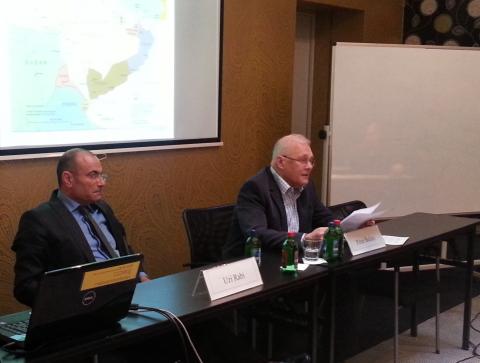Event Report - “Two years after the Arab Spring: A changing geopolitical environment in the Middle East”

CEU Center for EU Enlargement Studies (CENS) and the Embassy of the State of Israel in Hungary hosted a public lecture on 26 February 2013 entitled “Two years after the Arab Spring: A changing geopolitical environment in the Middle East”. The lecture was delivered by Mr. Uzi Rabi, Professor of Tel Aviv University.
Professor Rabi started his presentation by drawing some conclusions two years after the Arab Spring. He differentiated the recent revolutions from those that took place in the 20th century. The revolutions that occurred during the Arab Sprig involved the public at large and it was the people who believed in the power of change, justice and were no longer afraid of their rulers. He also underlined that the Arab Spring is not over and that it can happen again in any state of the Middle East.
Professor Rabi spoke about the Middle Eastern countries by dividing them into several groups. In the first group he put Egypt and Tunisia, describing them as the countries where he sees the revival of political Islam and the Muslim Brotherhood. In the second group he positioned Lebanon and Syria, which he illustrated as the “artificial states” created by the western agreements and held together by a might dictator. The third group is comprised of Saudi Arabia, Yemen and Qatar, which are doing well because they are wealthy but, according to Professor Rabi, should reconsider their future political actions. In his opinion, today’s map of the Middle East is misleading since the region is greatly influenced by its past and history, and that is what shapes its present and future.
As the Israeli-Palestinian conflict is concerned, he is in favor of a compromise in which Israel should strive for two separate states. Finally, Professor Uzi referred to Iran and Turkey, both of which are striving to become hegemons at the expense of the Arab states.
In the concluding remarks, Professor Rabi stressed that it took more than a hundred years for France to achieve a fully-fledged democracy after the French Revolution in 1789, which means that it will take much more time for the Middle East to accomplish the same.
The speech was followed by a lively question and answer session touching upon a variety of issues. The lecture was chaired by Péter Balázs, Director of CENS and former Hungarian Minister of Foreign Affairs.
